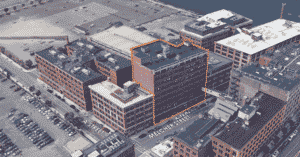
51 Melcher St. Approval of the office-to-lab conversion in Fort Point was delayed in September after City Council President Ed Flynn stated concerns about noise, vibration and biohazard waste removal. Image courtesy of studioTROIKA
There’s a new set of rules in the works for life science developers in Boston, including plans to regulate locations and design of lab buildings.
The Boston Planning & Development Agency is responding to the recent lab construction and conversion boom with new regulations designed to minimize negative effects on neighborhoods.
The BPDA’s Life Science Action Agenda released Monday will propose design guidelines for lab buildings by February. New definitions for lab buildings in the zoning code will be added following a community process that begins in mid-2023.
The BPDA began an internal review of life science development in 2021, seeking to define which neighborhoods are appropriate for lab projects and to reflect the goals of neighborhood planning studies, BPDA officials said in February.
But some residents and elected officials have raised concerns about the unique nature of life science buildings, ranging from their noisy ventilation systems and large mechanical penthouses to risks from research on airborne infectious diseases.
Approval of an office-to-lab conversion at 51 Melcher St. in Fort Point was delayed in September after City Council President Ed Flynn stated concerns about noise, vibration and biohazard waste removal.
Biosafety levels, as defined by federal rules on risks of disease research, are currently regulated by the Boston Public Health Commission. The BPDA said it will continue to coordinate lab health and safety planning with sister agencies.
The majority of recent projects have been designed to biosafety level 2, which reflects low risks to humans. Several biosafety 3 facilities, which involve research of serious diseases that can be transmitted through inhalation, operate in various hospital and Boston University facilities.
The agency also plans to launch an interactive map of life science development activity in Boston in mid-2023.
Boston has emerged as a top destination for life science expansion in recent years, and now has 5.5 million square feet of lab space inventory with another 3.4 million under construction, according to brokerage Newmark.








